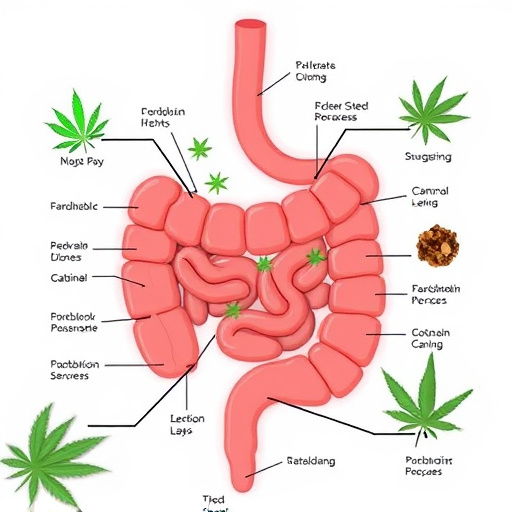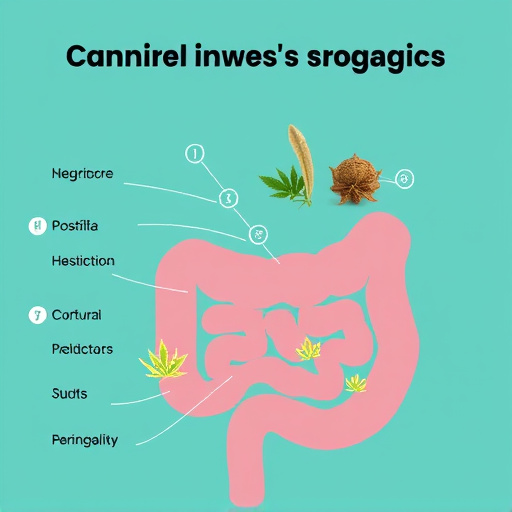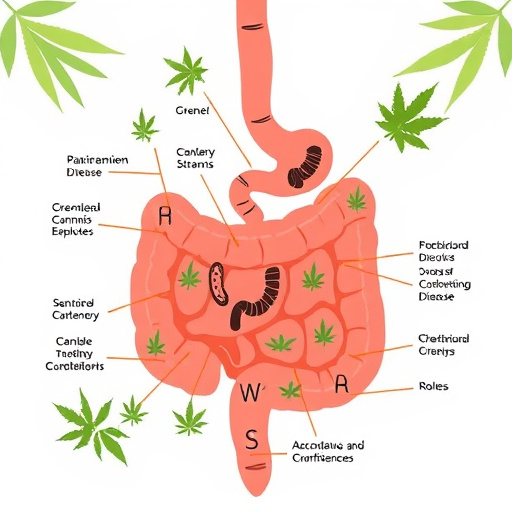Cannabis interacts with the body's endocannabinoid system to stimulate appetite, offering potential symptom management for individuals with Crohn's disease. High-THC strains bind to ECS receptors in the brain, increasing hunger, while CBD-rich strains may reduce nausea and promote food intake. The anti-inflammatory properties of specific cannabis strains could alleviate inflammation associated with Crohn's, and its appetite-stimulating effects could aid patients undergoing treatment.
Cannabis’ ability to stimulate appetite is well-documented, but why does it trigger hunger pangs? This article delves into the complex relationship between cannabis and hunger, focusing on cannabinoids as key players in regulating appetite. We explore specific cannabis strains beneficial for conditions like Crohn’s disease, where appetite suppression can be a serious issue. Understanding these mechanisms offers insights into both recreational and medicinal cannabis use.
- Understanding the Cannabis-Hunger Connection
- The Role of Cannabinoids in Appetite Regulation
- Exploring Cannabis Strains for Crohn's Disease Patients
Understanding the Cannabis-Hunger Connection

Cannabis has long been known for its ability to stimulate appetite, but understanding why it does so is a complex matter. The connection between cannabis and hunger is rooted in its interaction with our bodies’ endocannabinoid system (ECS), which plays a significant role in regulating various physiological processes, including eating behavior. When we consume cannabis, especially strains high in tetrahydrocannabinol (THC), it binds to receptors in the ECS, triggering a series of reactions that can lead to increased hunger or what’s commonly known as “munchies.”
For some individuals with medical conditions like Crohn’s disease, cannabis strains with specific cannabinoid profiles have been found beneficial. The anti-inflammatory properties of certain cannabinoids may help alleviate symptoms associated with Crohn’s, potentially leading to improved appetite and nutritional intake. This is particularly significant as maintaining a healthy diet is crucial for managing the disease effectively. Thus, understanding the cannabis-hunger connection can provide valuable insights into its therapeutic potential for various health conditions, including gastrointestinal disorders.
The Role of Cannabinoids in Appetite Regulation

Cannabis flowers contain a complex mix of chemicals, including cannabinoids like THC and CBD. These cannabinoids play a significant role in regulating appetite and can significantly influence eating behaviors. Research suggests that THC, the primary psychoactive compound, stimulates hunger by binding to specific receptors in the brain associated with reward and pleasure. This activation leads to increased cravings for food, often described as the ‘munchies’.
For individuals with certain medical conditions like Crohn’s disease, cannabis strains high in CBD have gained attention for their potential appetite-stimulating effects. CBD is believed to interact with the endocannabinoid system, which modulates various physiological processes, including hunger and satiety. Some studies imply that CBD might help reduce nausea and increase food intake in patients with Crohn’s or other gastrointestinal disorders, providing a natural way to manage weight loss associated with these conditions.
Exploring Cannabis Strains for Crohn's Disease Patients

For individuals living with Crohn’s disease, exploring cannabis strains can offer a promising avenue for symptom management. Cannabis has been studied for its potential anti-inflammatory properties, which may help reduce inflammation associated with Crohn’s. Specific cannabis strains known for their high CBD content have shown promise in easing gastrointestinal discomfort and promoting overall well-being.
Certain crohn’s disease cannabis strains are also recognized for their ability to stimulate appetite, a common challenge faced by patients undergoing treatment. The endocannabinoid system, which plays a crucial role in regulating hunger and digestion, makes cannabis an intriguing option for fostering appetite and improving nutrition in Crohn’s disease patients.
Cannabis’ effect on increasing hunger, particularly through its interaction with cannabinoids, offers potential therapeutic benefits, especially for individuals with conditions like Crohn’s disease. Specific cannabis strains have shown promise in managing symptoms and even reducing appetite loss, making them a worthy area of exploration for medical researchers. Understanding the cannabis-hunger connection can lead to innovative treatments that enhance quality of life for those dealing with chronic illnesses.














